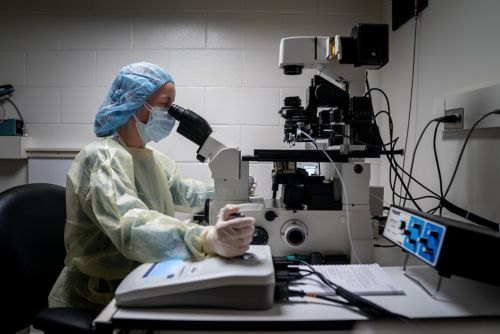St. Jude Family of Websites
Explore our cutting edge research, world-class patient care, career opportunities and more.
St. Jude Children's Research Hospital Home

- Fundraising
St. Jude Family of Websites
Explore our cutting edge research, world-class patient care, career opportunities and more.
St. Jude Children's Research Hospital Home

- Fundraising
Neuroembryology Core
Producing genetically engineered animal models and analyzing embryonic development to advance understanding of diseases and treatment-related effects impacting neurological development.
Overview
The Neuroembryology Core works closely with the Center for Advanced Genomic Engineering (CAGE) and individual investigators to produce gene-edited mouse and rat models. We assist with the generation, breeding and analysis of genetically altered models as well as embryo dissection and organ and tissue staining. Training is available for those interested in learning the various techniques used to generate these models.

Impact
In vivo modeling is vital to understanding the cause, progression and treatment of diseases, as well as examining potential side effects of treatment. Rodents are the most common and the most easily genetically manipulated animal for such modeling. With the advent of gene-editing technology it has become easier than ever before to generate such models. New variants of CRISPR technology, base-editing, in vivo and in vitro electroporation and use of rodent strains previously refractive to editing are being utilized to more precisely modify the genome to further our understanding of cancer and neurological disease.
Equipment
(1) Micro-injection rig with Nikon Eclipse TE300 microscope, manual Leica and Narashige micro-manipulators, Eppendorf FemtoJet, Xyclone laser, Burleigh piezo-drill, CellTram Air, on a Vibraplane air suspension table
(1) Micro-injection rig with Nikon Eclipse TE2000-U microscope, Eppendorf TransferMan NK-4 micro-manipulators, Eppendorf FemtoJet, Burleigh piezo-drill, CellTram Air, on a Vibraplane air suspension table
(1) Micro-injection rig with Nikon Ti-U microscope, Eppendorf TransferMan NK-2 micro-manipulators, Eppendorf FemtoJet, CellTram Vario, on a Vibraplane air suspension table
(2) Nikon SMZ-1500 dissecting scopes
(1) NEPA21 electroporator
(1) HeraCell 240 incubators and Cook K-MINC incubator
(1) Sutter P-97 and P-2000 micro-pipette puller
(1) Narashige MF-900 micro-forge
About the director
Valerie Stewart, MS
Valerie Stewart received her M.S. in microbiology from The Ohio State University. She learned blastocyst and pronuclear micro-injection in the lab of Frederick W. Alt, PhD. With a focus on immunology, Valerie contributed to the development of a Rag2 knockout mouse and a Rag2 blastocyst complementation assay, as well as an N-Myc knockout model. She has research experience working with embryonic stem cells, multiple sclerosis models and Alzheimer’s disease models. Valerie was instrumental in establishing and heading the transgenic facilities at the Cleveland Clinic—establishing cryopreservation services, new embryonic stem cell lines and adherent cell injection techniques—and at the University of Maryland School of Medicine. As director of the Neuroembryology Core, Valerie assists investigators in the use of gene-edited mice and rats, focusing on CRISPR techniques combined with micro-injection and electroporation.
The team
- Kristen Correia, PhD, Scientist
- Heide Oller, MS, Scientist